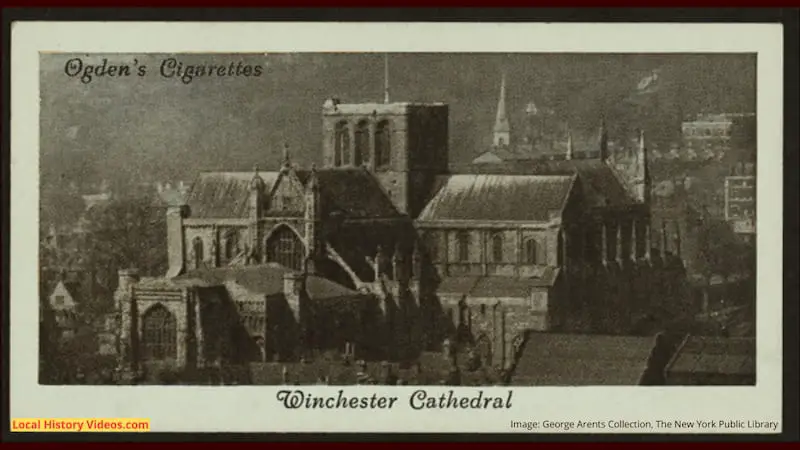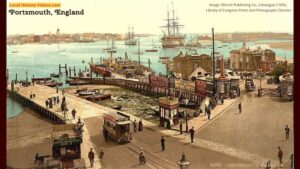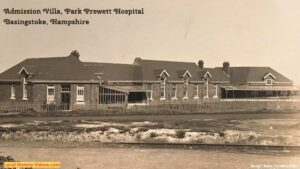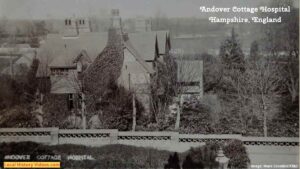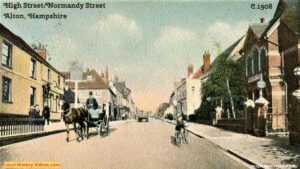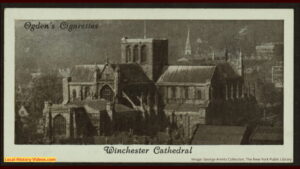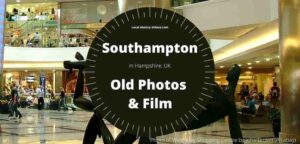Enjoy a glimpse of history through old images of Winchester, Hampshire, England, UK.
This page begins with old pictures, maps, book illustrations and then photos, taking us from the English Civil War years through to the final year of the First World War.
Old Pictures of Winchester, England
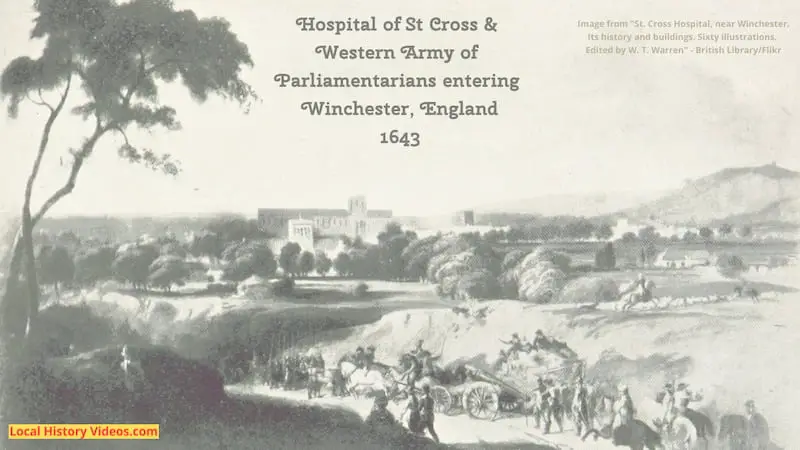
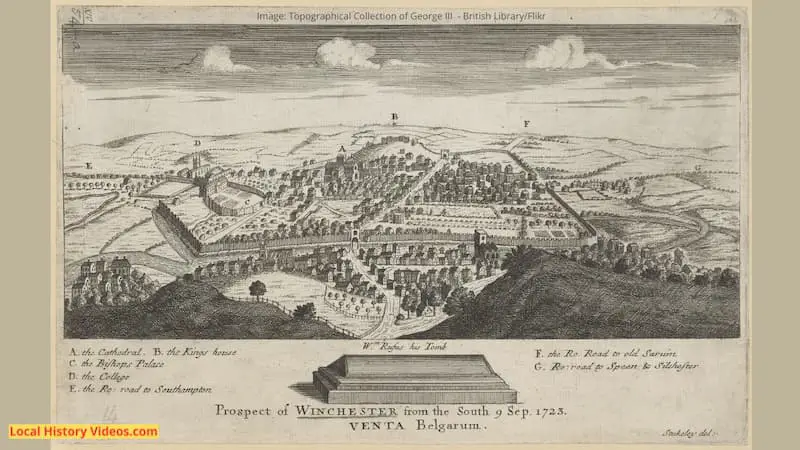
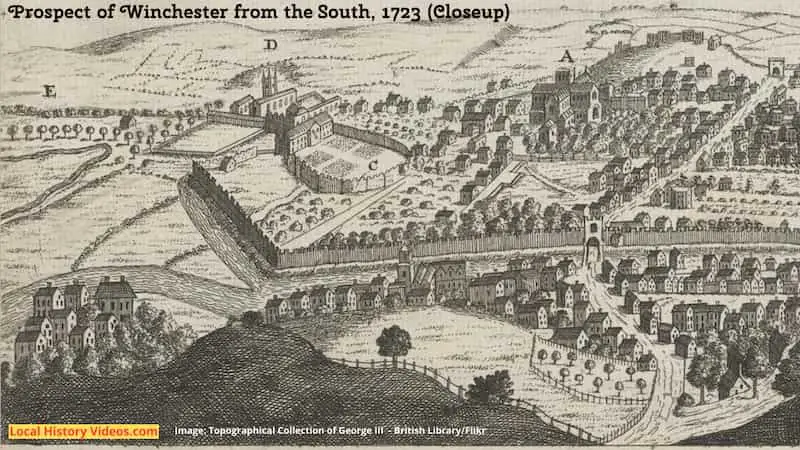
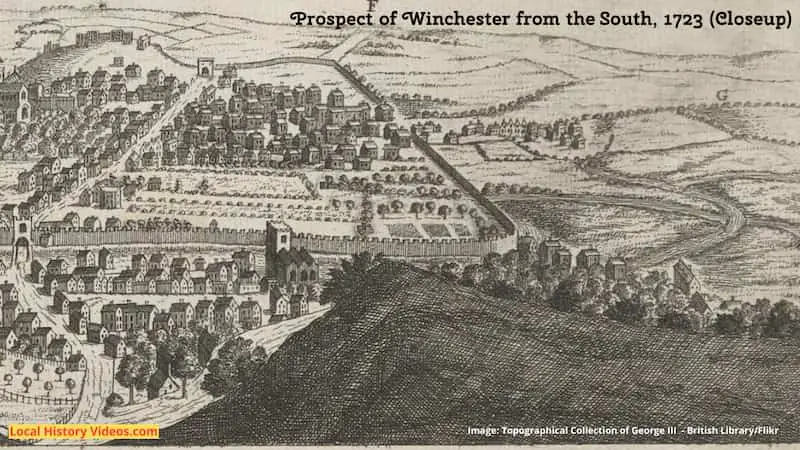
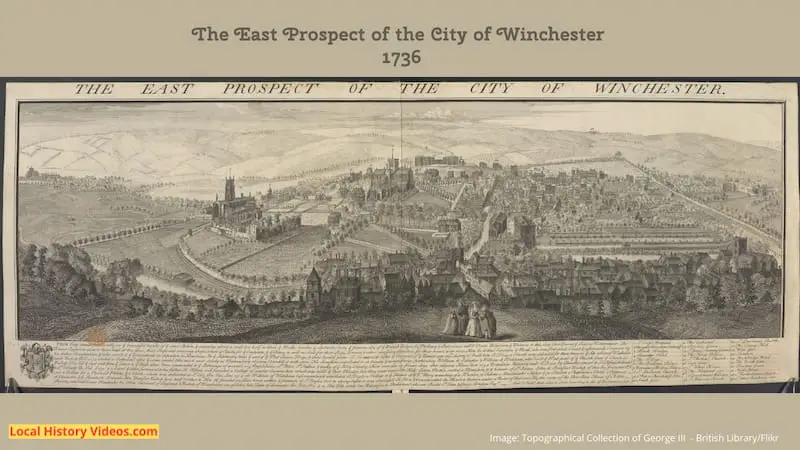
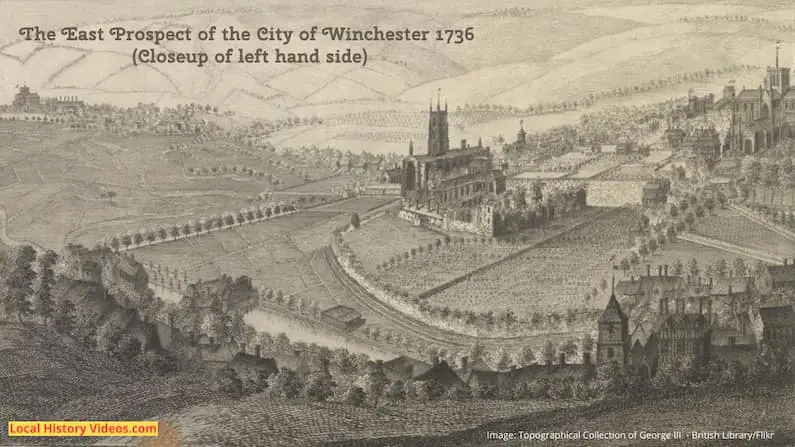
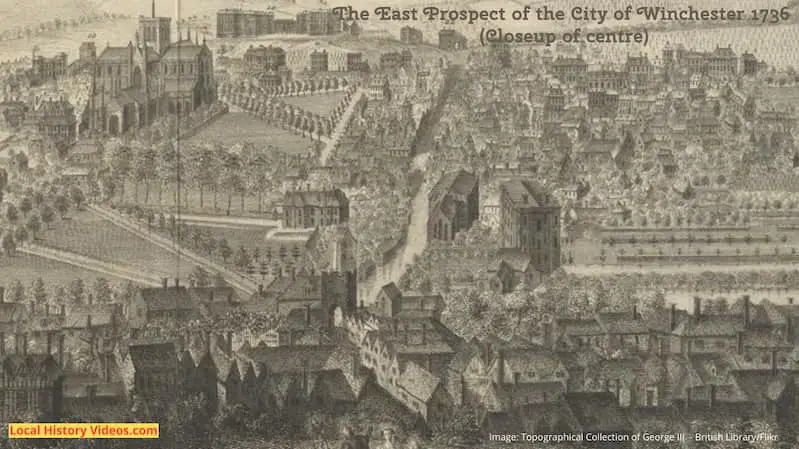
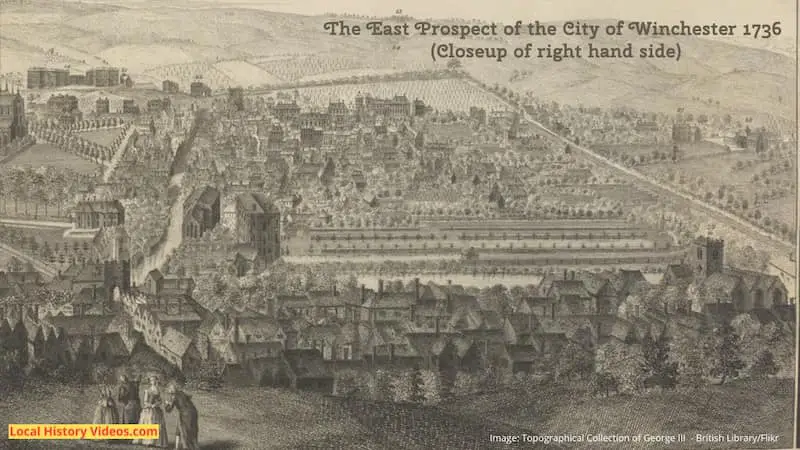
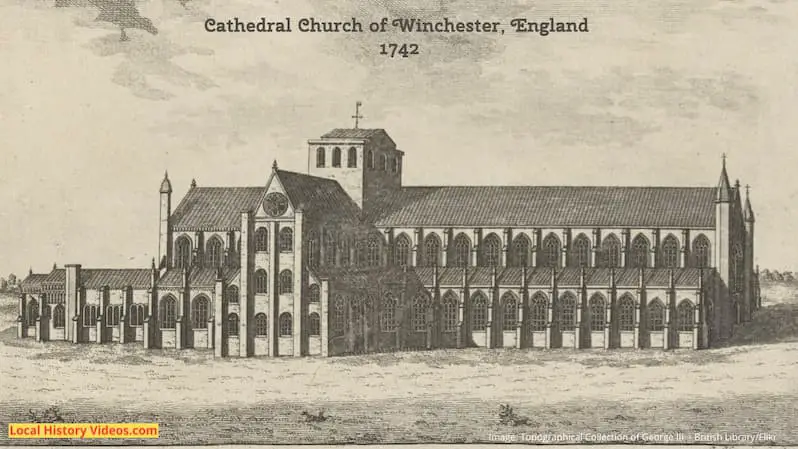
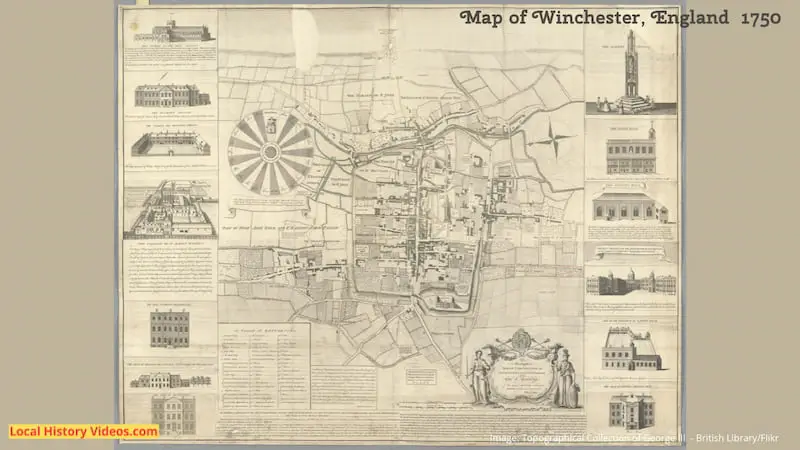
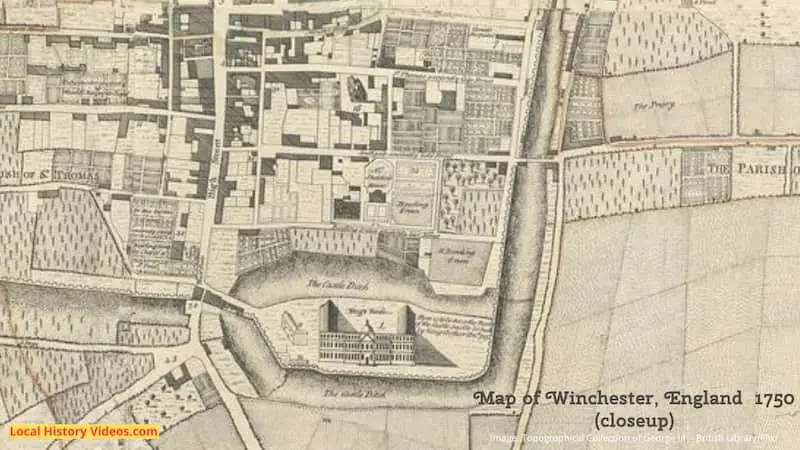
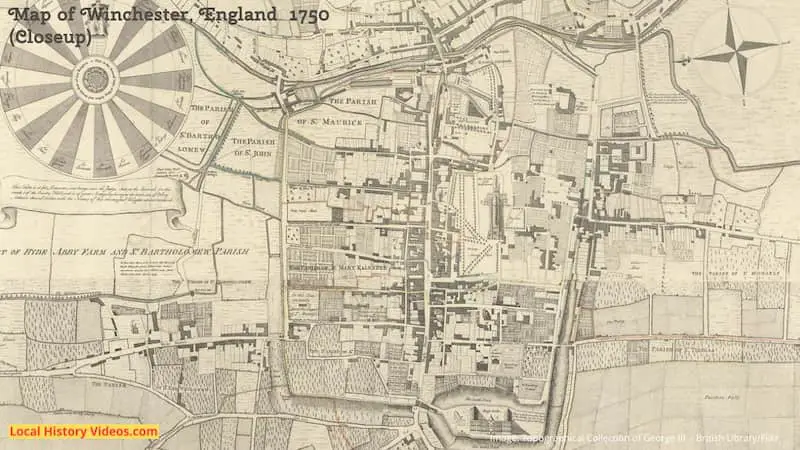
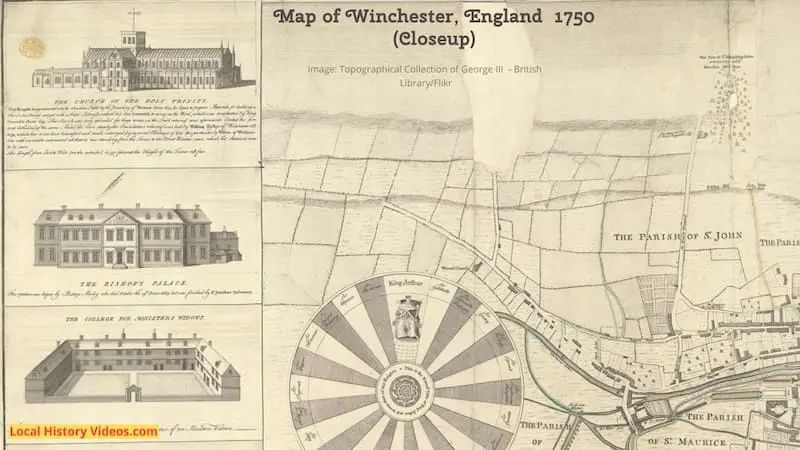
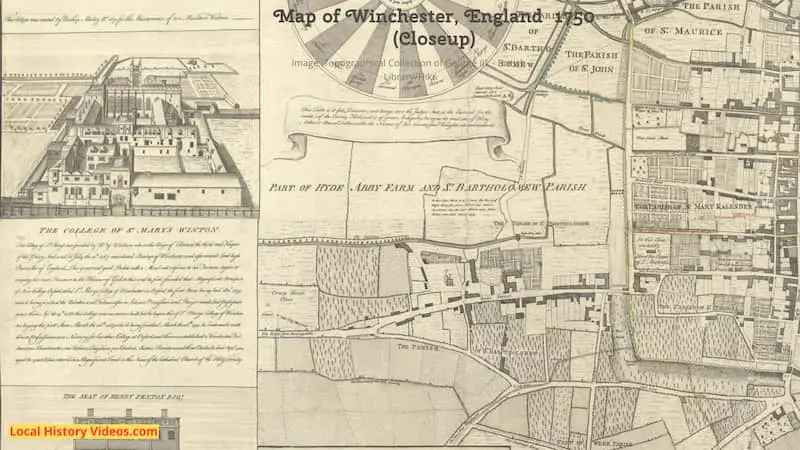
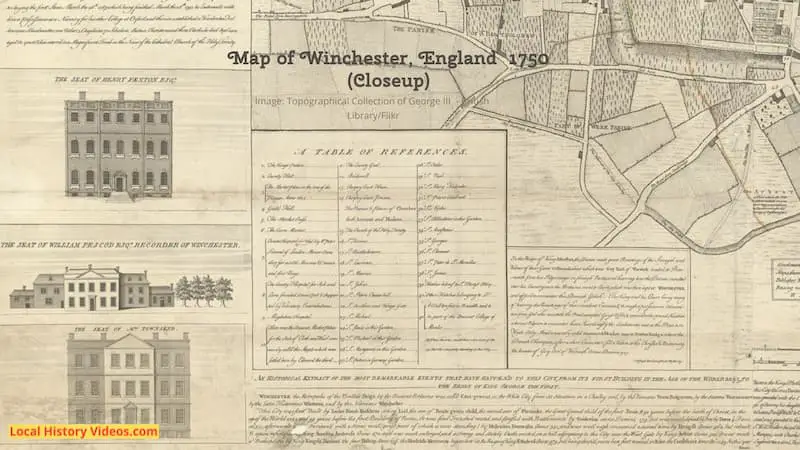
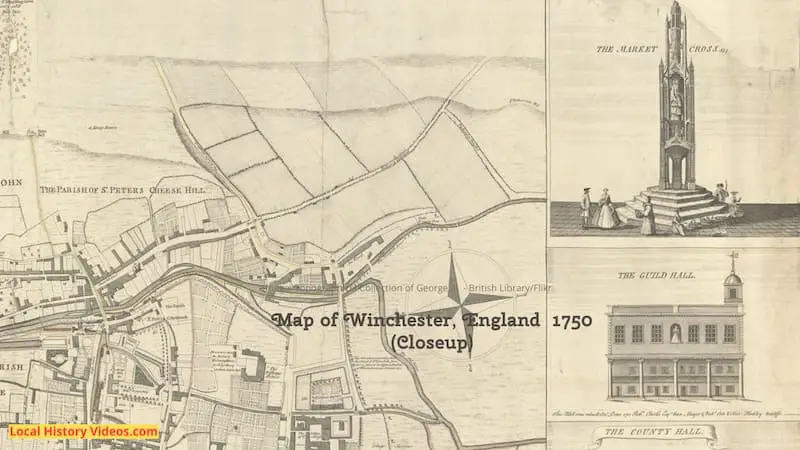
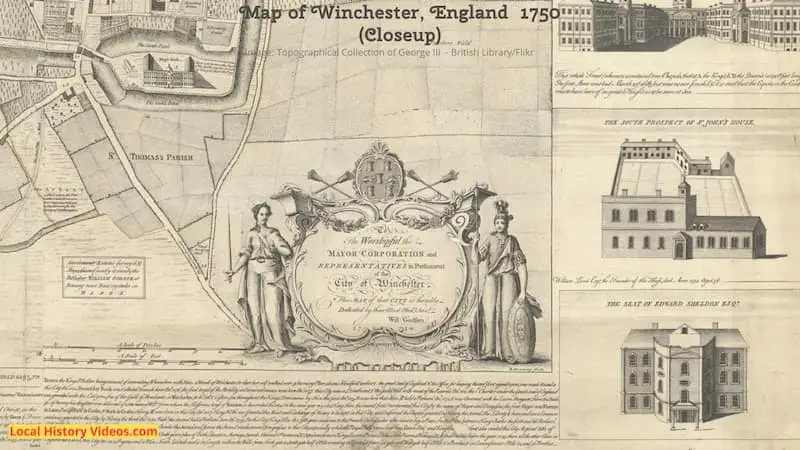
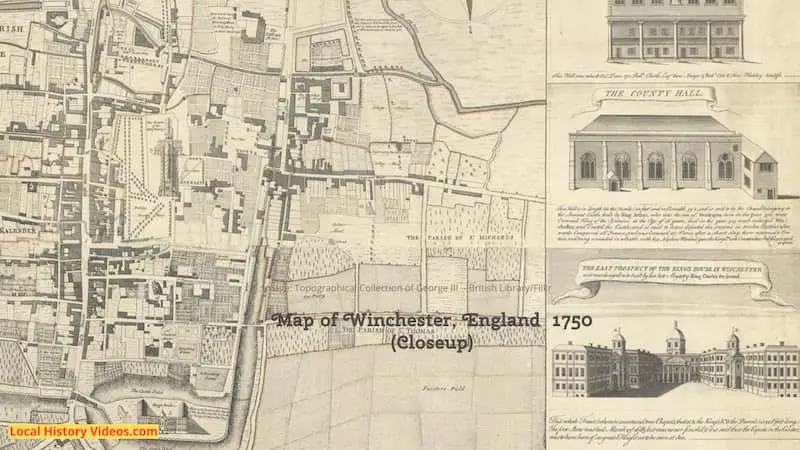
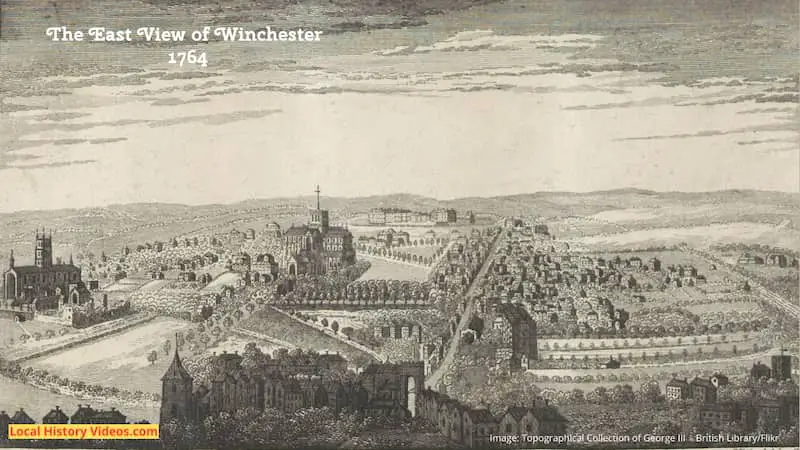
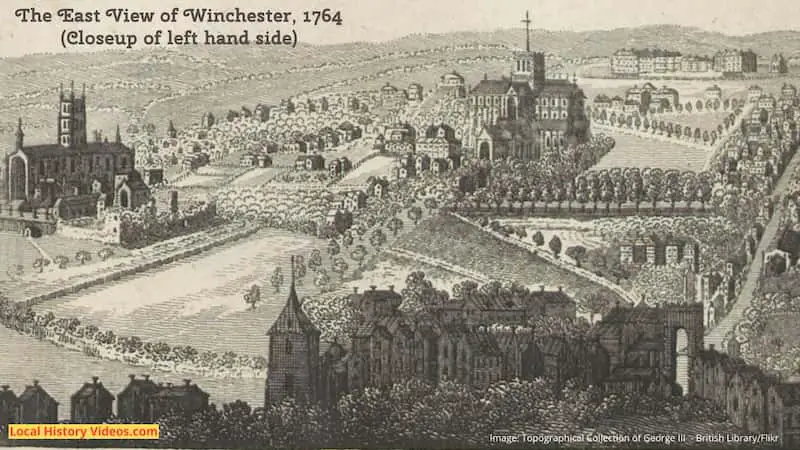
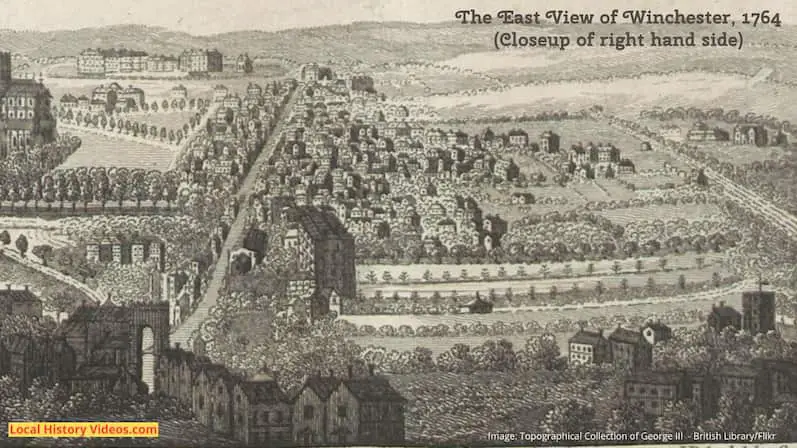
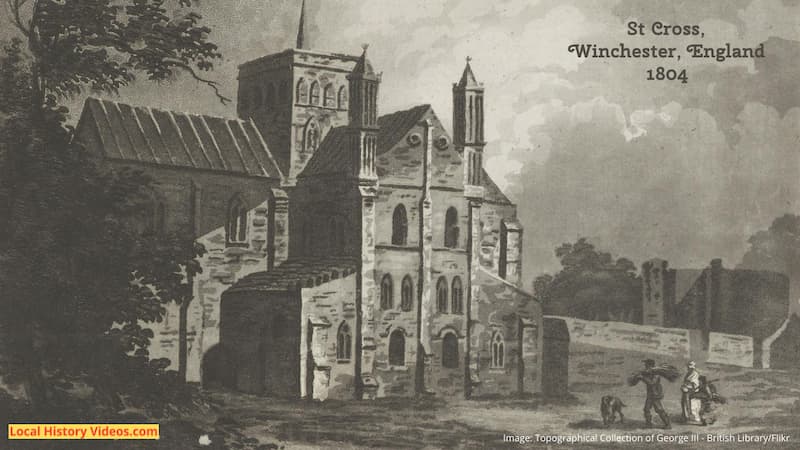
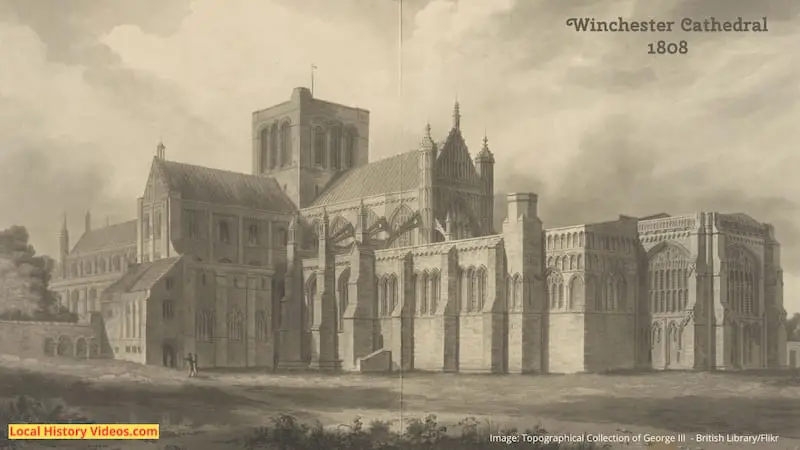
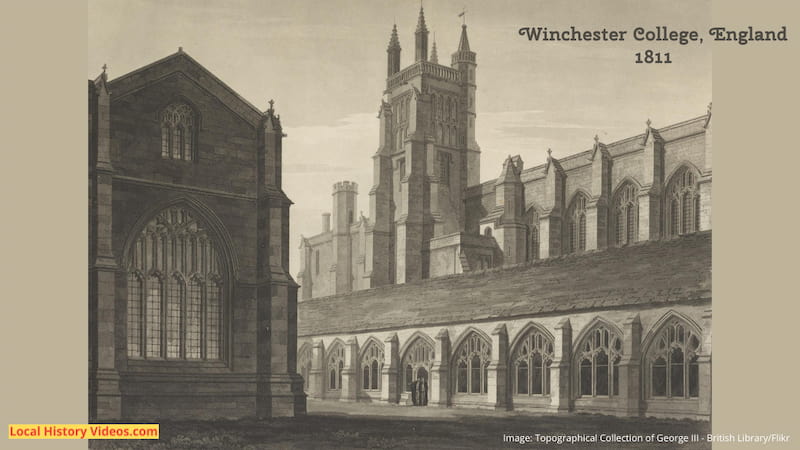
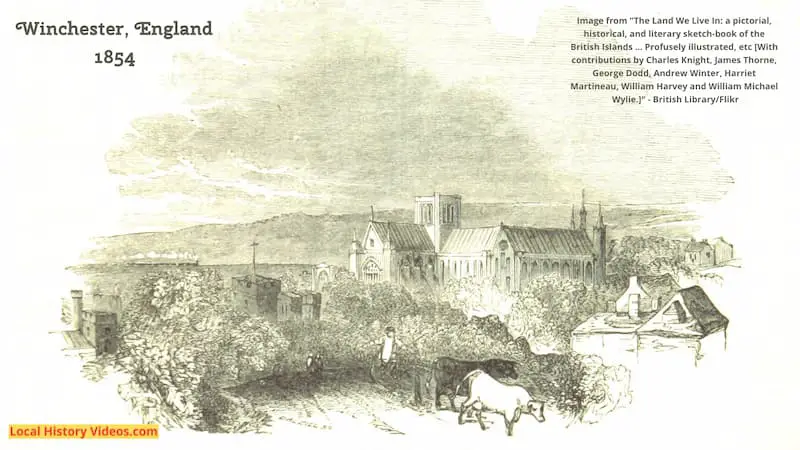
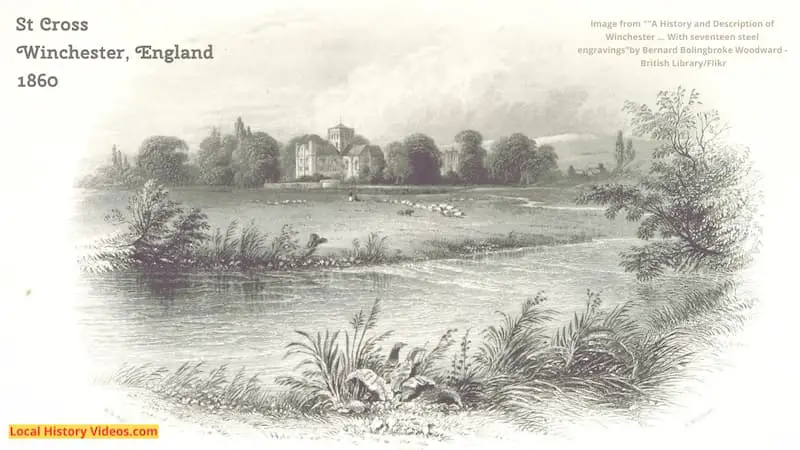
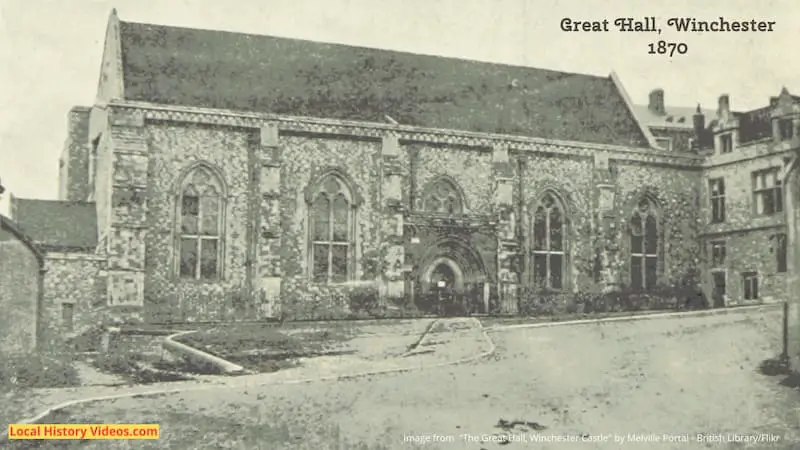
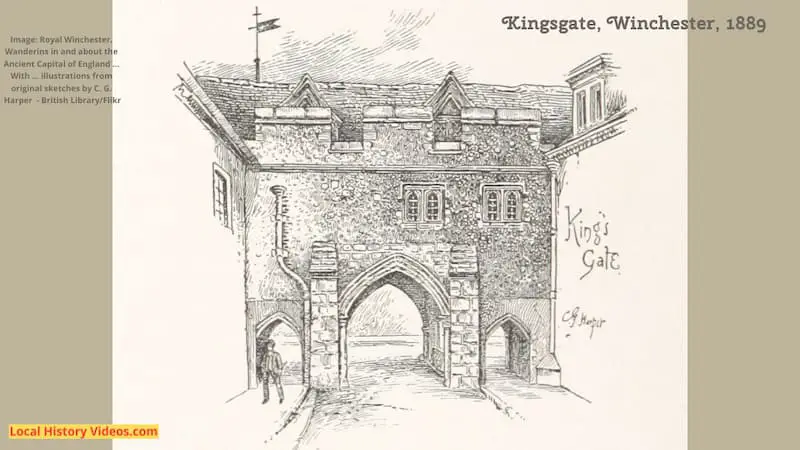
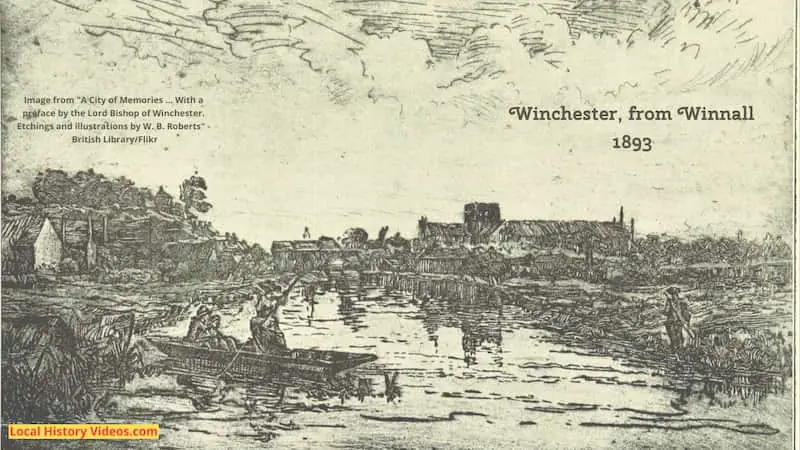
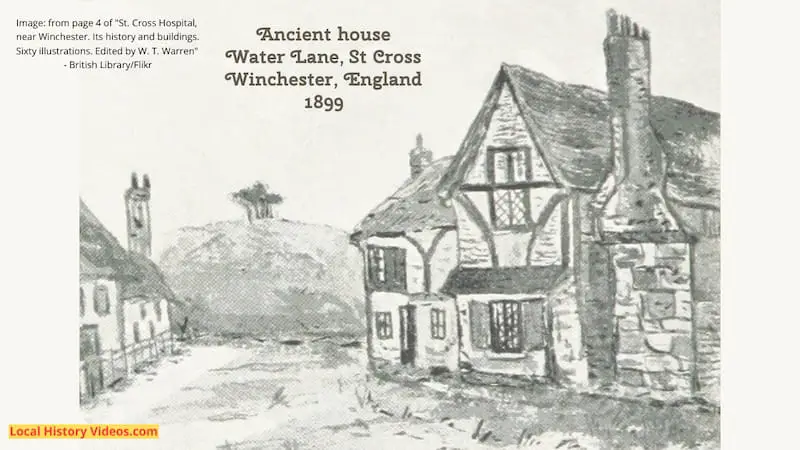
Old Photos of Winchester, England
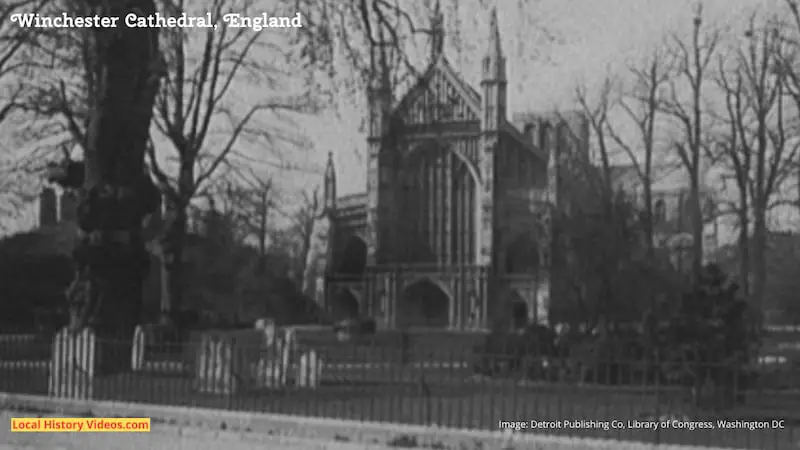
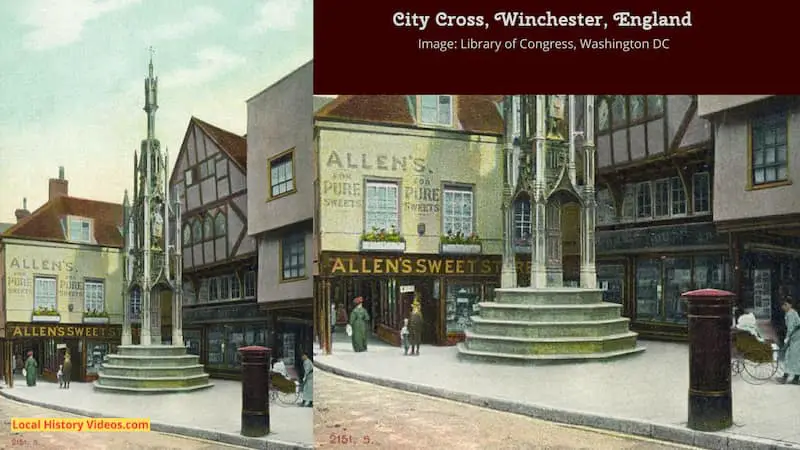
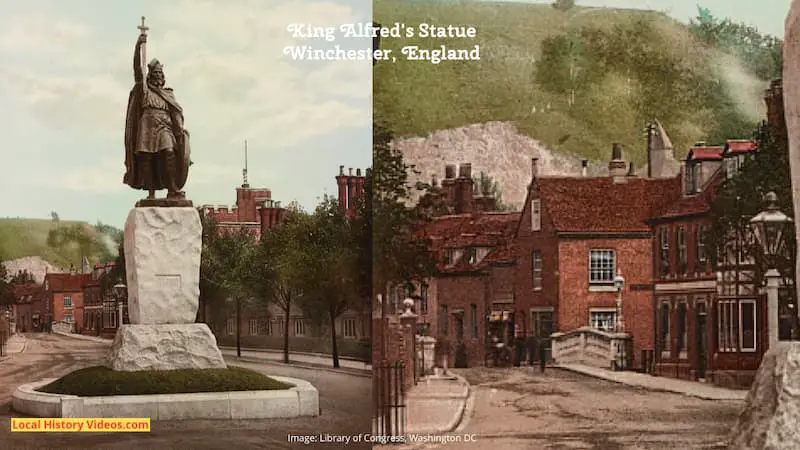
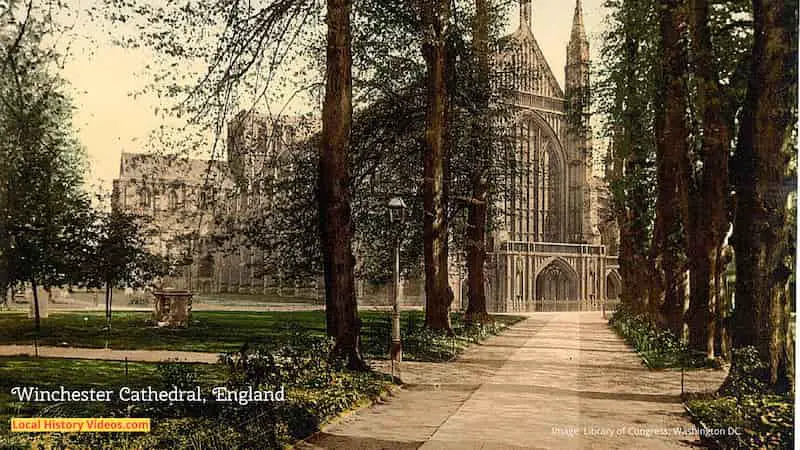
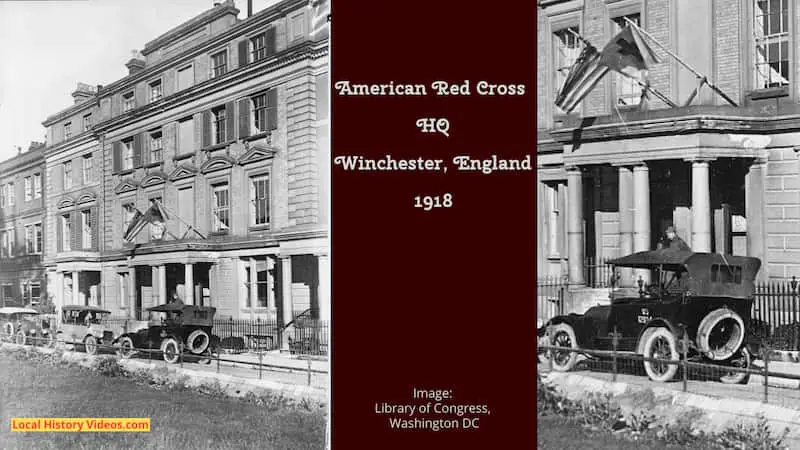
Winchester in 1934
This silent footage shows quiet roads and alleyways dominated by pedestrians and cyclists, and just a handful of black cars driving around the streets or parked at the roadside.
The City Of St. Swithin – Winchester Aka Winchester – Scenes Of City & Its Surroundings (1934) – British Pathé on YouTube
Royal Visit 1946
On 23 May 1946, King George VI and Queen Elizabeth visited Winchester. The historic city had its streets decked with flags, and people crowded along the route to be taken by the royals’ car. 3,000 schoolchildren waited at Castle Square.
KING AND QUEEN AT WINCHESTER – British Movietone on YouTube
Agricultural Workers 1947
In 1947, farm workers from across the country assembled at Winchester for the National Union of Agricultural Workers parade, where a new banner was unfurled to replace the one lost during the war.
There are glimpses of Winchester’s Guildhall and surrounding streets in this news item.
One Minute News (1947)- British Pathé on YouTube
Queen’s Visit 1955
1955 marked 800 year since Winchester’s city charter was awarded. Queen Elizabeth II and the Duke of Edinburgh therefore made an official visit.
They met some of the staff and students at the almost 600 year old Winchester College, before driving through the town to the Guildhall.
UNITED KINGDOM: ROYAL VISIT TO WINCHESTER (1955) – British Pathé on YouTube
Winchester in the 1980s
This is a silent collection of clips recorded in the 1980s, for an episode of ‘Wish you were here?’ which was broadcast on 23rd March 1987.
The Cathedral and other notable landmarks are included, along with some residential streets and a few pedestrians.
1980s Winchester | Hampshire | Winchester | Wish you were here? | 1987 – ThamesTv on YouTube
Historic Book
Extract from
“An Historical Account of Winchester, with Descriptive Walks“
by Charles Ball (of Winchester).
Published 1818
Pages 68-69
“The fatal issue of the battle of Naseby, in 1645, rendering the King’s affairs desperate, and most of the places in the west having submitted to the parliamentary forces, an army was dispatched under Oliver Cromwell for the reduction of Winchester. On the 28th of September, 1645, he accordingly appeared before the city, which he immediately summoned; and upon receiving an answer from the Mayor that the Governor of the castle had alone the authority of surrendering the city, an attack was commenced upon it from
an eminence on the south-west side, which still preserves the memory of the event by the designation it bears of “Oliver’s Battery.” His chief efforts were, however, directed towards the castle, which, after resisting the impression of his cannon for about a week, was surrendered to him, though not without strong suspicion of treachery on the part of Lord Ogle the governor. No sooner was Cromwell master of the castle, than, in conformity with
his usual practice, he began to demolish it by mining and blowing it up with gunpowder. The same policy was exercised upon the fortifications of the city; and in like manner the Bishop’s castle of Wolvesey was reduced to a heap of ruins. The town hall and several churches and other edifices, both of a public and private description, were also demolished, and, for a considerable time after the period in question, Winchester presented little more than a scene of desolation and distress.
On the 21st of December, 1647, Winchester again welcomed its Sovereign, but under far different circumstances from those in which it had received many of his predecessors – the unfortunate Charles, conducted as a prisoner, slept in this city, on the first night of his journey from Hurst Castle to Windsor, but little more than a month previous to the horrible catastrophe which has left an indelible stain upon the annals of our country.”
Pages 71-73
“The next important event in the history of Winchester was of the most awful description, viz. a severe visitation of the Plague, which broke out in the metropolis, in May, 1665, and extended to this city early in the following year, where it continued its ravages for nearly a twelvemonth. On this dreadful occasion all manner of trade or correspondence with any other part of the kingdom was necessarily at an end; cart-loads of dead bodies were daily carried out, and promiscuously deposited in large pits dug for their reception on the neighbouring downs; nor was it without great difficulty that the necessaries of life were procured for the wretched survivors. The markets were removed to a rising ground just without the west gate of the city, where they were held once a week, and were regulated by all the measures a prudent jealousy of life could suggest, to prevent the spreading of the contagion. The method of bartering was thus: the articles required for the markets were laid, by the country people, upon a large stone, and fetched from thence, upon their retiring to a certain distance, by the townsmen, who, in return, deposited the money agreed for, into a vessel of water provided for that purpose.
By the deplorable effects of this malady, Winchester was so greatly depopulated that, before the disorder had materially abated, many of the public streets were grown over with grass; nor were its calamitous effects merely confined to external appearance: many of the wretched beings who had escaped its fury, surviving but to lament the dissolution of their nearest connections, and themselves reduced to a state of extreme poverty and in digence. And upon this melancholy occasion, the humanity and benevolence of the more affluent citizens seem to have been exercised with peculiar effect. Disregarding their private sorrows and personal dangers, they zealously applied themselves to the relief of their indigent fellow sufferers, and, by their timely assistance, preserved many from a
cruel death who were actually languishing for want of nourishment and the common necessaries of life. They also formed themselves into a perpetual society for the relief and assistance of their fellow townsmen, under the designation of “The Natives’ Society;” and the epoch of this truly benevolent transaction, as well as of the unfortunate occasion from whence it arose, has since been signalised by the erection of an Obelisk, with suitable inscriptions, upon the spot on which the markets were held, and the base of which is formed by the actual stone on which the traffic was conducted.”
More Pictures of Old Winchester, England
You may be interested in following my Pinterest Board about old photos, vintage postcards, historic maps and antique pictures of this ancient Cathedral city.
https://www.pinterest.co.uk/LocalHistoryVideos/winchester-england-old-photos-pictures
More about Hampshire
- Old Images of Hampshire, EnglandGlimpse history through old images of Hampshire, England.
- Old Images of Bordon, HampshireGlimpse history through old images of Bordon, Hampshire, England.
- Old Images of Basingstoke, HampshireGlipse history through old images of Basingstoke, Hampshire, England.
- Old Images of Andover, HampshireEnjoy a glimpse of history through old images of Andover, in Hampshire, England, UK.
- Old Images of Alton, HampshireGlimpse history through old images of Alton, Hampshire, England.
- History in Old Images of Winchester, EnglandEnjoy a glimpse of history through old images of Winchester, Hampshire, England, UK. This page begins with old pictures, maps, book illustrations and then photos, taking us from the English Civil War years through to the final year of the First World War. Old Pictures of Winchester, England Old Photos of Winchester, England Winchester in… Read more: History in Old Images of Winchester, England
- History in Old Images of Portsmouth, EnglandGlimpse history through old images of Portsmouth, in the southern English county of Hampshire, UK.
- Old Images of Southampton, EnglandEnjoy a glimpse of history through old images of Southampton, Hampshire, England, UK.
- Old Images of the Bygone Port of SouthamptonThis page is dedicated to footage about the ships filmed at the Port of Southampton in the old days.
- Old Images of the Army at AldershotDiscover vintage film of Aldershot Army days, including the popular Aldershot Army Show which has entertained visitors for many decades.

